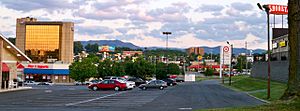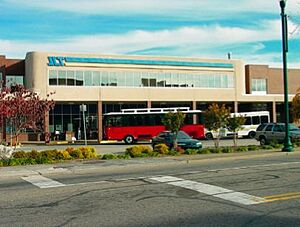Johnson City, Tennessee facts for kids
Quick facts for kids
Johnson City
|
|||||
|---|---|---|---|---|---|
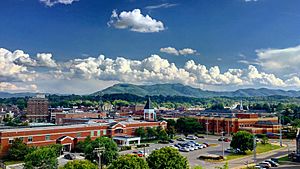
Downtown Johnson City
|
|||||
|
|||||
| Motto(s):
Go. All. Out.
|
|||||
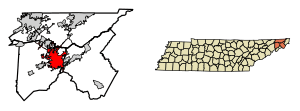
Location of Johnson City in Carter, Sullivan and Washington counties, Tennessee
|
|||||
| Country | United States | ||||
| State | Tennessee | ||||
| Counties | Washington, Carter, Sullivan | ||||
| Founded | 1856 | ||||
| Incorporated | 1869 | ||||
| Founded by | Henry Johnson | ||||
| Government | |||||
| • Type | Council-manager government | ||||
| Area | |||||
| • City | 43.75 sq mi (113.32 km2) | ||||
| • Land | 43.44 sq mi (112.52 km2) | ||||
| • Water | 0.31 sq mi (0.80 km2) | ||||
| Elevation | 1,634 ft (498 m) | ||||
| Population
(2020)
|
|||||
| • City | 71,046 | ||||
| • Estimate
(2023)
|
73,337 | ||||
| • Rank | 8th in Tennessee | ||||
| • Density | 1,635.38/sq mi (631.42/km2) | ||||
| • Urban | 128,519 (US: 261st) | ||||
| • Metro | 207,285 (US: 215th) | ||||
| • CSA | 514,899 (US: 87th) | ||||
| Time zone | UTC−5 (Eastern (EST)) | ||||
| • Summer (DST) | UTC−4 (EDT) | ||||
| ZIP codes |
37601-37604, 37614, 37615 & 37684
|
||||
| Area code(s) | 423 | ||||
| FIPS code | 47-38320 | ||||
| GNIS feature ID | 1328579 | ||||
Johnson City is a vibrant city located in Tennessee, USA. It stretches across parts of Washington, Carter, and Sullivan counties. Most of the city is in Washington County.
In 2020, about 71,046 people lived here. This makes Johnson City the eighth-largest city in Tennessee. It is also the main city of the Johnson City Metropolitan Area. This area includes Carter, Unicoi, and Washington counties. About 207,285 people lived in this larger area in 2020. Johnson City is also part of the Tri-Cities region.
Contents
Exploring Johnson City's Past
William Bean, thought to be the first white settler in Tennessee, built his home near Johnson City in 1769. Later, in the 1780s, Colonel John Tipton started a farm here. This farm is now the Tipton-Haynes State Historic Site.
How Johnson City Began
The city was founded in 1856 by Henry Johnson. It started as a railroad station called "Johnson's Depot." Johnson City quickly became a major train center in the Southeast. This was because three railway lines met in the downtown area.
Railroad History
In the late 1800s and early 1900s, Johnson City was a hub for two important railroads. One was the East Tennessee and Western North Carolina Railroad, also known as "Tweetsie." The other was the Clinchfield Railroad. Both offered scenic trips through the Blue Ridge Mountains. The Norfolk Southern also passes through the city.
Changes During the Civil War
During the American Civil War, the town's name was briefly changed to "Haynesville." This was to honor a Confederate Senator. But after the war, Henry Johnson's name was quickly brought back. He was elected the city's first mayor in 1870. The town grew fast until 1890, thanks to railroads and mining.
Growth in the 20th Century
In 1901, a special hospital for disabled Civil War veterans was built here. This huge campus cost $3 million to build. Before this, the whole town was valued at only $750,000. In 1911, East Tennessee State Normal School (now East Tennessee State University) was started. Johnson City then grew rapidly, becoming the fifth-largest city in Tennessee by 1930.
Music and Nicknames
Johnson City was a lively place for old-time music. Famous recording sessions happened here in 1928, known as the Johnson City Sessions. Local musician "Fiddlin' Charlie" Bowman became a national star from these sessions.
During the 1920s, the city was nicknamed "Little Chicago" due to its connection to bootlegging in the Appalachian Mountains.
Exploring Johnson City's Location
Johnson City is located in the northeastern part of Washington County. The city covers about 43.75 square miles (113.32 square kilometers). Most of this area is land, with a small part being water.
Natural Features
Buffalo Mountain, a ridge over 2,700 feet (823 meters) high, is a city park. The Watauga River arm of Boone Lake is also partly within the city limits. Boone Lake is a reservoir managed by the Tennessee Valley Authority.
Weather in Johnson City
Johnson City has a humid subtropical climate. This means it has warm summers and cool winters. The city's elevation and closeness to the Appalachian Mountains help keep temperatures milder. It rains a lot here, with about 45 inches (1148 mm) of rain each year. Summer is usually the wettest season. Snowfall is moderate, averaging about 15.6 inches (39.6 cm) per year.
| Climate data for Johnson City, Tennessee | |||||||||||||
|---|---|---|---|---|---|---|---|---|---|---|---|---|---|
| Month | Jan | Feb | Mar | Apr | May | Jun | Jul | Aug | Sep | Oct | Nov | Dec | Year |
| Record high °F (°C) | 78 (26) |
80 (27) |
83 (28) |
89 (32) |
94 (34) |
102 (39) |
99 (37) |
99 (37) |
97 (36) |
90 (32) |
84 (29) |
76 (24) |
102 (39) |
| Mean daily maximum °F (°C) | 45 (7) |
50 (10) |
59 (15) |
68 (20) |
76 (24) |
83 (28) |
86 (30) |
85 (29) |
79 (26) |
69 (21) |
59 (15) |
48 (9) |
67 (19) |
| Mean daily minimum °F (°C) | 25 (−4) |
28 (−2) |
34 (1) |
42 (6) |
51 (11) |
60 (16) |
64 (18) |
63 (17) |
55 (13) |
44 (7) |
35 (2) |
28 (−2) |
44 (7) |
| Record low °F (°C) | −21 (−29) |
−12 (−24) |
−1 (−18) |
20 (−7) |
28 (−2) |
39 (4) |
46 (8) |
36 (2) |
34 (1) |
22 (−6) |
11 (−12) |
−9 (−23) |
−21 (−29) |
| Average precipitation inches (mm) | 3.42 (87) |
3.69 (94) |
3.59 (91) |
3.50 (89) |
4.44 (113) |
4.56 (116) |
5.44 (138) |
4.15 (105) |
3.03 (77) |
2.44 (62) |
3.34 (85) |
3.62 (92) |
45.22 (1,149) |
| Average snowfall inches (cm) | 5.2 (13) |
4.2 (11) |
2.3 (5.8) |
0.4 (1.0) |
0 (0) |
0 (0) |
0 (0) |
0 (0) |
0 (0) |
0 (0) |
0.9 (2.3) |
2.6 (6.6) |
15.6 (40) |
| Average relative humidity (%) | 59.0 | 71.5 | 69.0 | 67.0 | 69.5 | 73.0 | 75.0 | 76.5 | 76.5 | 74.0 | 68.5 | 69.5 | 74.0 |
People of Johnson City
| Historical population | |||
|---|---|---|---|
| Census | Pop. | %± | |
| 1880 | 685 | — | |
| 1890 | 4,161 | 507.4% | |
| 1900 | 4,645 | 11.6% | |
| 1910 | 8,502 | 83.0% | |
| 1920 | 12,442 | 46.3% | |
| 1930 | 25,080 | 101.6% | |
| 1940 | 25,332 | 1.0% | |
| 1950 | 27,864 | 10.0% | |
| 1960 | 31,187 | 11.9% | |
| 1970 | 33,770 | 8.3% | |
| 1980 | 39,753 | 17.7% | |
| 1990 | 49,381 | 24.2% | |
| 2000 | 55,469 | 12.3% | |
| 2010 | 63,152 | 13.9% | |
| 2020 | 71,046 | 12.5% | |
| 2023 (est.) | 73,337 | 16.1% | |
In 2020, Johnson City had 71,046 residents. There were 30,724 households and 15,904 families living in the city.
Diversity in Johnson City
The city is home to people from many different backgrounds.
| Group | Number | Percentage |
|---|---|---|
| White (not Hispanic) | 55,950 | 78.75% |
| Black or African American (not Hispanic) | 4,809 | 6.77% |
| Native American | 164 | 0.23% |
| Asian | 1,710 | 2.41% |
| Pacific Islander | 37 | 0.05% |
| Other/Mixed backgrounds | 3,878 | 5.46% |
| Hispanic or Latino | 4,498 | 6.33% |
Johnson City's Economy
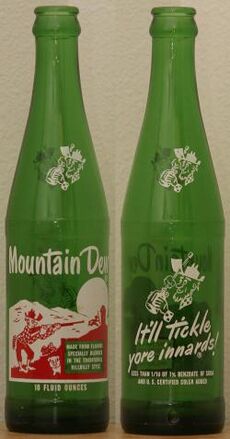
Johnson City is an important economic center. Its economy is largely driven by East Tennessee State University and its medical facilities. These include the Johnson City Medical Center, Niswonger Children's Hospital, and ETSU's medical and pharmacy colleges.
Did you know the popular soda Mountain Dew started in Johnson City? In 2012, PepsiCo even released a special flavor called Mountain Dew Johnson City Gold to honor the city.
In 2019, the Johnson City area produced goods and services worth about $9.1 billion.
Top Employers in the City
Here are some of the largest employers in Johnson City:
| Employer | Number of employees |
|---|---|
| Ballad Health | 3541 |
| East Tennessee State University | 1990 |
| Washington County School System | 1275 |
| James H. Quillen VA Medical Center | 1259 |
| American Water Heater Company | 1194 |
| AT&T Mobility | 1000 |
Major Companies Based Here
Several important companies have their main offices in Johnson City:
- American Water Heater Company (part of A.O. Smith Corp.)
- Advanced Call Center Technologies
- Cantech Industries
- General Shale Brick LLC (part of Wienerberger)
- LPI, Inc.
- Moody Dunbar, Inc.
- Mullican Flooring
- R.A. Colby, Inc.
- TPI Corporation
Arts and Culture in Johnson City
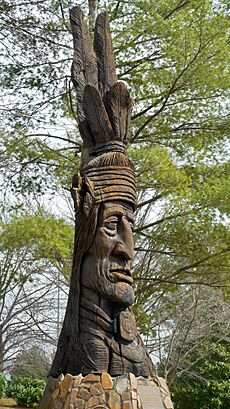
Public Art Around Town
Johnson City has many public art displays. There are usually 12 to 15 sculptures that change every two years. You can also find 24 bronze animal statues downtown. These were made by students and teachers at ETSU. The Johnson City Public Library even has clues to help you find all the animals! The city also features art on light poles and traffic boxes.
Shopping Fun
Johnson City is a major shopping area for a four-state region. You can find many well-known national stores here. There are also local shops and art galleries.
The Mall at Johnson City is the city's only indoor shopping mall. Many new stores are located in North Johnson City, especially along State of Franklin Road. Johnson City Crossings is one of the largest shopping areas there.
Places to Visit
- Buffalo Mountain Park
- East Tennessee State University Arboretum
- ETSU/Mountain States Health Alliance Athletic Center
- Founders Park
- Freedom Hall Civic Center
- Johnson City STOLport
- Thomas Stadium, a baseball field
- Tipton-Haynes State Historic Site
- Tweetsie Trail
- Watauga River
- William B. Greene Jr. Stadium
Sports in Johnson City
Johnson City has been home to several Minor League Baseball teams. The first professional baseball team, the Johnson City Soldiers, played here in 1910.
The Johnson City Cardinals were a long-running team. They played in the Appalachian League from 1975 to 2020. In 2021, the league changed. The Cardinals were replaced by the Johnson City Doughboys. This new team is for college baseball players.
Education in Johnson City
Colleges and Universities
East Tennessee State University (ETSU) is a large university with about 16,000 students. It also has a K-12 school called University School. This school was the first in the nation to have a year-round academic schedule.
Milligan University is just outside the city. It has about 1,200 students. Northeast State Community College also has a teaching site in downtown Johnson City. Tusculum College has a center in the Boones Creek area.
Schools for Kids (K-12)
Most of Johnson City's schools are part of the Johnson City School District. Some smaller parts of the city are in the Washington County School District.
Schools in the Johnson City School System include:
Elementary schools
- Cherokee Elementary
- Fairmont Elementary
- Lake Ridge Elementary
- Mt. View Elementary
- North Side Elementary
- South Side Elementary
- Towne Acres Elementary
- Woodland Elementary
Middle schools
- Indian Trail Middle School
- Liberty Bell Middle School
High schools
- Science Hill High School
Private Schools
- Ashley Academy (PreK-8)
- St. Mary's (K-8)
- Providence Academy (K-12)
- Tri-Cities Christian Schools (PreK-12)
- University School (K-12)
Getting Around Johnson City
Transportation
Johnson City is served by two airports: Tri-Cities Regional Airport (TRI) and Johnson City Airport (0A4).
Major Roads
Several important highways pass through Johnson City:
- Interstate 26
- U.S. Route 19W
- U.S. Route 11E
- U.S. Route 321
- U.S. Route 23
Public Transportation
Johnson City Transit runs a bus system within the city. This includes BucShot, which serves the ETSU campus.
Hospitals and Healthcare
Johnson City is a major medical center for the region. It serves people in northeast Tennessee, southwest Virginia, and parts of North Carolina and Kentucky.
The Johnson City Medical Center has a top-level trauma center. It also includes the Niswonger Children's Hospital. Franklin Woods Community Hospital is another important hospital here. The James H. and Cecile C. Quillen Rehabilitation Hospital helps patients recover from serious injuries.
Famous People from Johnson City
- Bill Bain, a founder of Bain & Company
- Sam Bettens, lead singer of the band K's Choice
- Jerry Blevins, Major League Baseball pitcher
- Ernie Bowman, Major League Baseball player
- Joe Bowman, bootmaker and marksman
- Mike Brown, American Motorcyclist Association rider
- Jo Carson, playwright and author
- Kid Kash, professional wrestler
- David Cole, founding member of C+C Music Factory
- Patrick J. Cronin, television and film actor
- Matt Czuchry, actor from Gilmore Girls
- David Davis, former U.S. congressman
- Lindsay Ellis, film critic and author
- Ray Flynn, famous miler
- Aubrayo Franklin, NFL defensive tackle
- Wyck Godfrey, film producer
- Jake Grove, NFL center
- Del Harris, NBA coach
- Holly Herndon, electronic musician
- Mark Herring, Attorney General of Virginia
- Herman Hickman, College Football Hall of Fame player
- Jim Hickman, professional baseball player
- Steven James, novelist
- Drew Johnson, political commentator
- Amythyst Kiah, Americana singer/songwriter
- Brownie King, NASCAR driver
- Catherine Marshall, author of Christy
- John Alan Maxwell, artist and illustrator
- Johnny Miller, NASCAR driver
- Daniel Norris, Major League Baseball pitcher
- Eureka O'Hara, drag queen and TV personality
- Mike Potter, NASCAR driver
- Phil Roe, former mayor and U.S. representative
- Bryan Lewis Saunders, artist and writer
- Connie Saylor, NASCAR driver
- Constance Shulman, actress and singer
- Steve Spurrier, Heisman Trophy winner and College Football Hall of Fame coach
- Robert Love Taylor and Alfred A. Taylor, brothers who were both governors of Tennessee
- Brad Teague, NASCAR driver
- Phyllis Tickle, author on religion
- Ed Whitson, MLB pitcher
- Samuel Cole Williams, historian and jurist
- Van Williams, NFL running back
Sister Cities
Johnson City has special connections with cities around the world. These are called sister cities:
Images for kids
See also
 In Spanish: Johnson City (Tennessee) para niños
In Spanish: Johnson City (Tennessee) para niños
 | Jewel Prestage |
 | Ella Baker |
 | Fannie Lou Hamer |







